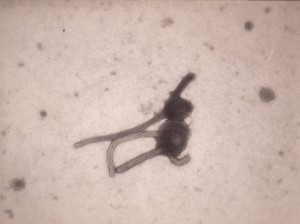Stop entry of Ebola in PH than fight it in Africa—ex-health chief

This undated photo made available by the Antwerp Institute of Tropical Medicine in Antwerp, Belgium, shows the Ebola virus viewed through an electron microscope. AP FILE PHOTO
MANILA, Philippines – It would be better for the government to train and maintain a core of medical professionals to prevent the entry of the Ebola virus than to send medical teams to fight the deadly disease in West Africa, Dr. Jaime Galvez-Tan said Saturday.
If at all, the Department of Health should send a team of five medical professionals to study how African countries are dealing with the virus, and apply what they learn in the Philippines, said Tan, a former secretary of health in the administration of then President Fidel Ramos.
“There are enough health professionals in the world and nearer Africa such as Europeans and Africans themselves,” Tan said in a telephone interview. “While it’s true that Africa may need it, I feel really that when we do a headcount, there are enough professionals in the world that can volunteer and offer their services to Africa.”
Tan, a health care advocate, said the government’s priority should be to safeguard the country’s borders against the entry of the Ebola virus given that many Filipino travelers and overseas workers come from Africa.
The government needs its own professionals to “safeguard its own interest first,” said Tan, president of Health Futures Foundation Inc., a non-profit organization that is involved in the design and management of health and social development programs.
“If we have a duty to preserve, protect or even treat or prevent Ebola virus in the Philippines, our health professionals would be better off staying in our country,” he said.
The government should have a core of 100 health professionals on heightened alert against the Ebola virus, Tan said.
“We should have a critical mass of health professionals all over the country who are knowledgeable about Ebola, and who would keep a double eye, a triple eye, on Ebola virus incidents if ever there are in the Philippines,” he said.
The entry of a single carrier into the country would entail thorough monitoring from the point of entry to his or her final destination, and should alert health professionals, Tan said.
“That in itself is part of the global action for prevention of further transmission of the disease,” he said.
If the DOH eventually decides to send a team, it should send five medical professionals to study how people in Africa and Europe “handle Ebola virus,” Tan said.
“I have no problem in sending a team to be aware and be capacitated to help in knowing how to deal with Ebola if and when it reaches the Philippines,” he said. “We’re talking of real experiences in dealing with Ebola.”
RELATED STORIES
PH may send health workers to West Africa
World Ebola fears grow